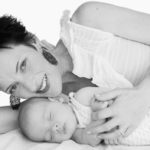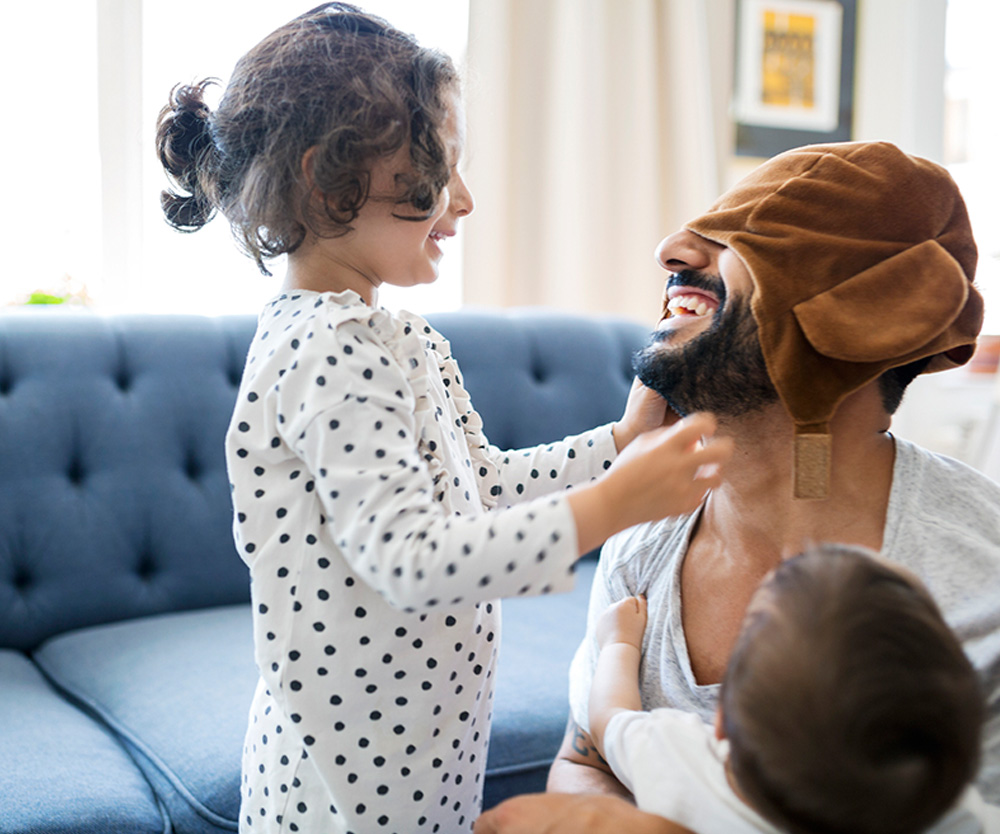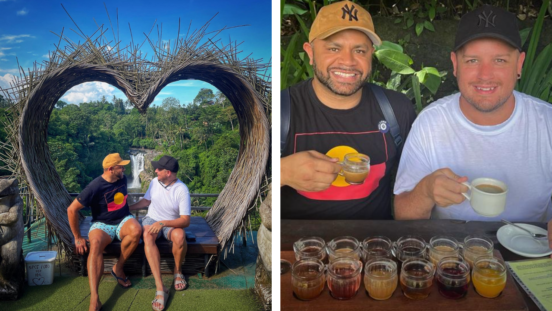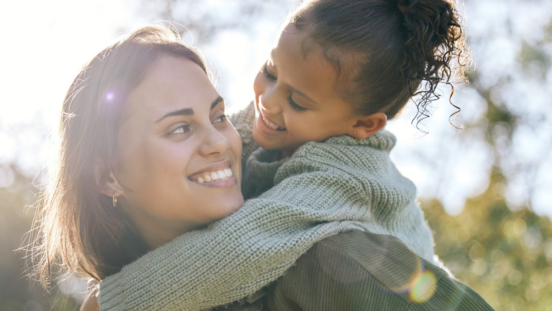Our Down Syndrome story: ‘She taught me how to be a better person’

Author Peter Rix relives the moment his baby was born with Down syndrome and takes us on a journey of hope and love
Author Peter Rix relives the moment his baby was born with Down syndrome and takes us on a journey of hope and love, which prompted him to write his novel Water Under Water, inspired by his unique daughter, Joanna.
“I need to tell you, Mr Rix, this baby of yours … ” In a room off the maternity ward, the gynaecologist gives me the bare facts and hurries away. I stumble back along the corridor to the delivery room, stand at my wife Jenny’s bed, searching for the words to deliver the news.
That moment is as tangible for me today as it was 33 years ago. Many other moments, too, that followed hard on its heels; the first numbing hours of knowing, but not really knowing, dark, unfathomable days of struggling to get my head around a new language of alien words – for us back then, “mongoloid”, “retarded”, what is
a “syndrome” exactly?
And then weeks of feeling that, although Jenny and I were the same people we had always been, our lives had been stripped away and replaced with a confusion of questions and tears and desperation. There was the overwhelming sense, too, that nothing could ever be the same again.
Of course, it was never the same again, but looking back, it amuses and shames me to recall how self-satisfied, how complacent I must have been before our daughter, Joanna, was born with Down syndrome. And how unreasonably despondent I was afterwards.
Even in my ignorance, I must have known, surely, how much worse off than us so many other parents were? And that if they had survived, so could we. Or, more accurately, so could I.
Jenny found a combination of acceptance and strength that I could only marvel at. I am still unsure if that was just me, or if fathers generally, so proud, so full of expectations for their son or daughter, have more difficulty in bridging the gap between anticipation and reality.
How has it been then, to be the father of a child – a young woman now – with an intellectual disability?
Jo was born just as the dreadful, high-walled institutions that once housed people like her were being closed. And rightly so. Yet it has meant that as we cared for her in our family, every support service – childcare, schooling, respite care, meaningful employment – have all been hard won. We learned early on that there are never many votes in disabilities.
At a personal and family level, life with Jo has also been a roller-coaster ride of emotional highs and lows. I remember reading an article that included the learned statement: “Children with Down syndrome tend to be quiet and compliant, very loving, but unresponsive to stimuli.”
Quiet? Compliant? You must be joking! There I am with five-year-old Jo in the local mall. One second she’s right beside me and then she is gone. Vanished. How could any child disappear like that, let alone one supposed to be “unresponsive to stimuli”? I charge around in a frantic, futile search, then get security scouring the place.
When I call Jenny to confess, she calms me down … and sure enough, here comes Jo, wandering out from behind the counter of the ice-cream stand, holding aloft her triumphant double-scoop prize. My emotional outburst of frustration and relief is met with amazement.
“But Dad, I wasn’t lost, I was here all the time helping the ice-cream man.” And then an admonishment. “Maybe you were lost.”
It was always too easy to jump to conclusions with Jo. Take the “holiday ranch incident”.
Jo at nine, exploring while the rest of the family relaxes. Until we notice that someone has released all the hens from the chook run! It takes forever in the heat and chook-poop to round them up. Finally, we get them all back inside and Jo cops a serve from everyone.
Later, the ranch boss waggles his finger at us. “Those hens are free-range! You’ve put them right off their laying.”
“Disabilities people always get the blame,” Jo tells me tearfully and I learn a lesson about making assumptions.
Then there is the day that I can hardly bear to recall, years later, when she rages,
“Dad, you don’t know what it’s like for me in my life! Michael and Suzanne [her brother and sister] get to have everything, like uni and boyfriends and girlfriends and drivers’ licences and proper jobs, and I only get to do disability things.”
And yet, Jo works hard to carve out a life for herself. She persists as I could not. Every morning, she is up before dawn, showered, dressed and off to catch buses and trains before I am out of bed. She will be at the Sunnyfield factory, where she works, at least an hour before the gates open. “I need to be early,” she says, “so my bosses don’t get angry with me.”
Jo has always had expectations. She enrols in the summer holiday program at NIDA every year. She loves to act, but it’s not just that. She perseveres with her weekly singing lessons. She sits endlessly copying out Shakespearean soliloquies.
Jo has goals, you see, her sights set on Hollywood, or the Bell Theatre Company, or the latest musical. She perseveres with the dance steps and lines and costume designs, even though in her heart, I fear, she knows the call will not come. “I like to think about it in my brain,” she says. And the next morning, there is another note on my desk. “Dad, do you know Mr Spielberg’s address? I need to audition.”
We give her as much independence as we can. She shares that right with the rest of us, doesn’t she, to live a life that is useful, fulfilled and hopeful? As she said to me once, “I can do lots of things, but I can’t do anything about the Down syndrome.”
There are nearly 200,000 people in Australia who live with an intellectual disability. These people have brains that function differently from those that we consider “normal”. Not that they can be lumped into a single category, not the ones I have known, at least. They can amaze with feats of memory and calculation, wisdom and insight. They can be generous and mean-spirited, loving and hateful … just like the rest of us.
Although, perhaps there is one other thing our daughter does share with each of her peers – the desperate yearning to be just like her brother or sister, to not be limited to “disabilities things”.
For Jenny and I, and thousands of Australian parents like us, a new worry looms. Jo will outlive us. What happens to her when we are no longer around? We are luckier than many, her siblings will help to the extent they are able to.
Yet Jo needs to live close to the people she knows, the bus and train routes she knows, close to the shops and picture theatres and doctors and dentists she knows and where she is known.
Throughout Australia, there is a chronic shortage of appropriate supported-living housing for people like her. And even when we found three publicly owned derelict houses in our local area, our proposal to convert them was met by government indifference and a NIMBY (Not In My Backyard) campaign by a small group of residents which stunned us with its prejudice and downright meanness.
We’ll work it out, though, somehow. In the early days, I often used to wonder what Jo might have been without Down syndrome. To what purpose might she have turned her determination, her courage and love for life? I have learned not to think like that anymore.
Something else I have gained from her – you can only do what you can do and, eventually, that will be enough. Hopefully.
One of Jo’s great loves is to give speeches. Birthdays, end of year concerts, graduations … give Jo an audience and a microphone and she’ll be away.
At Jenny’s 50th, she waxed lyrical for ages, with me, the ever-anxious father, hovering nearby lest she blurt out some inappropriate family secret. As always, she had the audience eating out of her hand.
“On behalf of everyone here,” she finally wrapped it up, “I want to thank my favourite parents for having me.”
And I thank her, too, for many things over the past 33 years. Yet in the end, it is as simple as this – my daughter, Jo, showed me how to be a better person.




